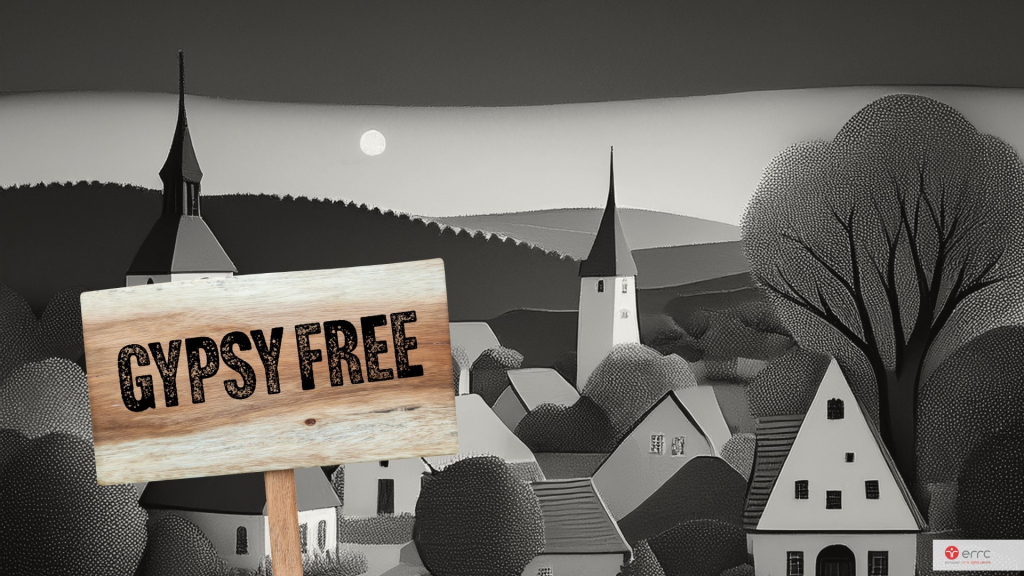Apartheid by stealth: shocking scandal of ‘Gypsy free’ village in Hungary revealed
06 May 2025

Investigative journalist Róbert Báthory has revealed how, for almost 20 years the village of Teresztenye, in the north-eastern part of Hungary has remained ‘Gypsy free’. In a shocking film report from Szabad Europa, Báthory reveals what happened when a Romani family did move in, and how they have been subjected to relentless racist intimidation ever since.
Back in 2002, the local government acquired the right of pre-emption for every single property in the settlement, citing a heritage protection decree. Effectively, the mayor – convicted fraudster Attila Brogli –decides who can buy property in Teresztenye.
As one local real estate agent, who is also involved in the screening process, explained: “The municipality wanted to know who would want to buy a house here, and they could filter buyers so that only those who they think are right for the settlement could buy.” The estate agents pitch the tiny settlement in their adverts as an idyllic oasis of silence and peace. It is also a place where as Báthory put it: “Over the past twenty years, a well-functioning Roma prevention system has been built.”
The system, Báthory revealed, is simple but effective: the prospective buyer is first screened by the real estate agent, and then they are brought for a personal interview with the mayor, who decides whether to waive the right of pre-emption. Officially, they are categorized as either ‘regular’ or ‘non-regular’ people: “In practice – as a real estate agent admitted in a telephone conversation – prospective buyers ‘of Roma origin in any sense’ are excluded.”
Five years ago, the ‘apartheid system’ failed, when László Sifter and his wife Ági bought a house in Teresztenye. The Romani couple were filtered as ‘regular people’. After hearing the real estate agent repeatedly declare that there were no Romani residents in the village, the Sifters told the mayor about their Romani origin as they didn’t want to move with their children to a place where this would be made a problem. The mayor reassured them he only distinguishes between good and bad people. The couple took the mayor at his word and bought the house.
Róbert Báthory’s shocking film report reveals how the family were subjected to a relentless campaign of harassment, intimidation and exclusion designed to make their lives unbearable and force them to leave Teresztenye. The mayor Attila Brogli – who was sentenced with his wife to 18 months in prison for budget fraud and forgery, later modified to a three-year suspended sentence – repeatedly refused to be interviewed.
The local government stopped providing the children with transport to school; surveillance cameras recorded László being attacked and beaten by three men, where he sustained injuries that included broken ribs. In another incident a drunken man discharged a firearm behind the house. The family was also subjected to official and police harassment: a total of 14 official investigations, including six guardianship inspections. This has caused the family much stress and trauma, but the Sifters are not leaving: “I didn’t graduate from law school so that a mayor could decide where I can live or not,” says Ági.
The Teresztenye system was described by one lawyer as ‘creative’ but legal nonsense, as “the Fundamental Law guarantees the right to freedom of movement and the right to property. The right for someone to acquire a property and live where they want is clearly a fundamental right that can be derived from the Fundamental Law.” The government office found nothing of significance amiss when it examined the Teresztenye local government's decree. When the Sifter family contacted the Equal Treatment Authority about their plight, the authority replied that since they had managed to buy the property, their rights had not been violated.
This ‘apartheid by stealth’ sets a chilling and fundamentally lawless precedent. According to Borsod 24, what makes the situation in Teresztenye particularly topical is the fact that the government has considered similar derogations to protect "overpopulated Hungarian cities from further immigrants" by giving local governments a right of first refusal, and discretionary powers to decide who can and who cannot move into town. In occupied territories, where official and genocidal collaboration with Nazi Germany was once the rule and not the exception, the very idea of legally facilitating ‘Gypsy-free zones’ ought to be a matter of shame. But when it comes to circumventing the fundamental rights of racialized others, this is a time of brazen shamelessness.




